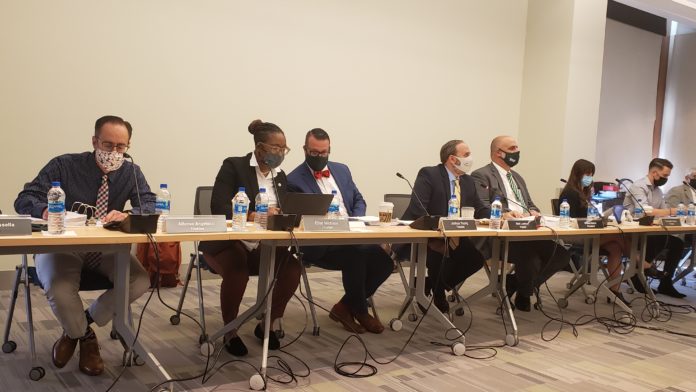Slippery Rock University trustees approved a balanced budget totaling $197 million in expenditures at last month’s council of trustees meeting, held in the Smith Student Center.
Although balanced, the university is only seeing a possible $770,000 surplus at the end of the fiscal year. Trustee Robert Taylor voted against it, saying it did not do enough to protect students from increased costs in the near future.
“If you vote for this budget today, you’re essentially saying, ‘Yes, I’m prepared to pass a tuition increase,’” Taylor said.
He added that someone needed to “say no to the default” of passing budget shortfalls onto students and their families with more fees and increased tuition.
In order to close the revenue gap next year, SRU President William Behre said he expects he will be asking to increase tuition by 2% in December. That increase is based on enrollment projections for the next academic year.
Taylor said he didn’t blame Behre or the administration for the proposed budget because they are working with a limited scope to reduce costs. After the meeting, Behre said he agreed with Taylor when it comes to the university’s biggest expenditure – salaries.
“The challenge we have institutionally is that our primary obligations which, is our salaries, for the most part, are negotiated in Harrisburg,” Behre said. “So, the only way that we can reduce our salary expense will be to reduce our number of employees.”
According to Behre, SRU is one of the more efficient state universities when it comes to controlling costs and while there may be some room to reduce expenses on the university end, there isn’t much. For Behre, getting a handle on contract costs at the system level is needed.
For the past three years, the university has not raised tuition rates. This past spring, Behre and other university presidents were expecting a 1% increase in tuition rates, but the Pennsylvania State System of Higher Education Board of Governors froze rates to ease the burden on students caused by the pandemic.
With rising costs, mainly in salary and wages, the university was able to balance this year’s budget with more than $8 million in COVID-19 relief funds provided by the federal government.
Last year the university received almost $42 million in federal aid, with $24 million going directly to the university to cover pandemic-related expenses and revenue losses. That money was more than enough to cover losses and the university posted an $11 million surplus for the year.
The rest of the funding went directly to students with payouts over last year and the current academic year. In its last payment to students, over 6,700 undergraduate and graduate students received checks up to $1,500 that could be paid directly to this year’s fall tuition or given to the student to help with expenses.
As for fees, Behre said the university needs to start planning now for how the university will recoup continued pandemic-related costs into the next few years.
So far, students have not been charged for any COVID-19 related testing on campus. However, according to Behre, that testing is costing the university more than $20,000 a week. Although he does not know how long COVID-19 will be something the university must worry about, and Behre said he is done trying finding a balance of keeping the campus community safe and covering costs needs to be considered. He stressed, however, that there would be no new fees this academic year.
Along with approving the budget, the university also approved the naming of what was formally Miller Auditorium and Pearl K. Stoner Instructional Complex or East Gym and West Gym. The former will now be known as the Performance Arts Center while the later will be named Stoner East and Stoner West.
The council of trustees will meet again on Dec. 9-10. There, Behre plans to propose next year’s tuition increase request along with reporting on the status of dining and the university’s contract with Aramark.








